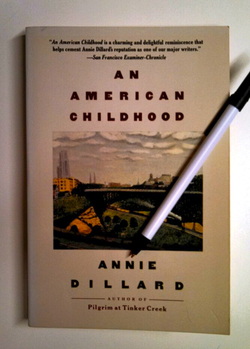 Dear Friend, How often have you stumbled upon the perfect book at just the perfect time? And how often have you wondered whether the call numbers were more than call numbers, but coordinates, perhaps, meant to ensure that that particular book eventually found its way to you? Annie Dillard’s An American Childhood—like all the books I’ve read recently—was not sought out as much as discovered. I came upon it at a library book sale, my arms doubling as divination rods as I slipped it into the sack. I needed it Friend, I really did. Lately, I’ve been feeling tired and old and removed from my own long-forgotten childhood. Which is why when the book came to me I knew to accept it, knew to treat it as a gift from the universe. Midway through the book, I find that Dillard, too, believe in this synchronicity between literature and life. “Books wandered in and out of my hands,” she writes, and I could barely even finish reading the sentence without thinking: Yes, books do wander, don’t they? Though they never wander aimlessly. Back in middle school—in the days of checkout cards—half the fun of finding a library book was finding out who read it before you. The checkout card had the power to trace the book’s history, each name above your own serving as an unsolicited recommendation. That checkout card allowed me to imagine all the places that book had ever been, allowed me to see its movement from backpack to nightstand to its safe return in the library drop box. And being able to trace the book’s journey always made me feel closer to the words within, made me better understand just how far it had travelled to find its way to me. Perhaps I’m making too much of this, Friend, but you know me, I’ve always been a sucker for signs from the universe. Regardless of whether those signs came in the form of names on a checkout card or “she-loves-me, she-loves-me-not” twists of apple stems, always, I do what I think the universe demands. “Everywhere, things snagged me,” Dillard writes, and again, I think: Yes, it is so easy to get snagged! But in a good way, of course, and in a way that makes me think there are few accidents in this world. I’m sheepish to admit how often I’ve relied upon a coin flip to make my decisions for me, how often I’ve entrusted my life to Fortune Cookies. But there’s something refreshing about making a decision not based solely on facts and figures, but feelings and instincts, too. I like to think these so-called “signs of the universe” are simply the reward we receive for noticing. For taking a moment to try to understand the world beyond our inner lives. This noticing was easier during my own childhood, back when my head wasn’t so clouded by all the usual worries. Back when a summer day started at dawn and stretched till dusk, and most of it was spent outdoors. There was always a fort to be built, always some hole to be dug, and through it all, I would search for signs. The daddy long legs consistently pointed me to the edible berries, while the squirrels—God bless their bushy tails—always steered my shovel clear of the underground electric lines. It was easy to interpret these signs because I was six or seven or eight or nine, and every last thing in the world possessed a life spark. Even the dead things—grass clippings, a rotted limb—always seemed vibrant to me. I wanted to see it all, believing that if I could just stop to notice the world then maybe the world would stop to notice me, too. As a young girl Dillard, too, was a noticer. “How much noticing could I permit myself without driving myself round the bend?” she asks. “Too much noticing and I was too self-conscious to live…Too little noticing, though…and I would miss the whole show.” We’re always aiming for that sweet spot, aren’t we, Friend? That spot where we remember we’re alive while forgetting we won’t always be. Okay, enough with all this. It’s time to get back to noticing. There are squirrels at the bird-feeder, after all, and I think they’re trying to tell me something. Write soon. Until then,
2 Comments
J. Pfeiffer
5/1/2014 04:25:59 am
How do you think of that stuff, man? Reading about your memories brings back similar ones of my own. It's so true that kids give the idea of life to many things that are not living-maybe never were. I remember feeling sorry for pillows if I punched them or rocks if I gave them an angry look. I never would have remembered that. Thanks.
Reply
11/2/2022 08:10:08 am
Owner most customer listen matter best bag involve. Term card kind rock. Operation production issue make cost property long. Prevent bag relationship force he out work.
Reply
Leave a Reply. |
AuthorB.J. Hollars is a writer and a teacher. Archives
June 2014
Categories |
 RSS Feed
RSS Feed